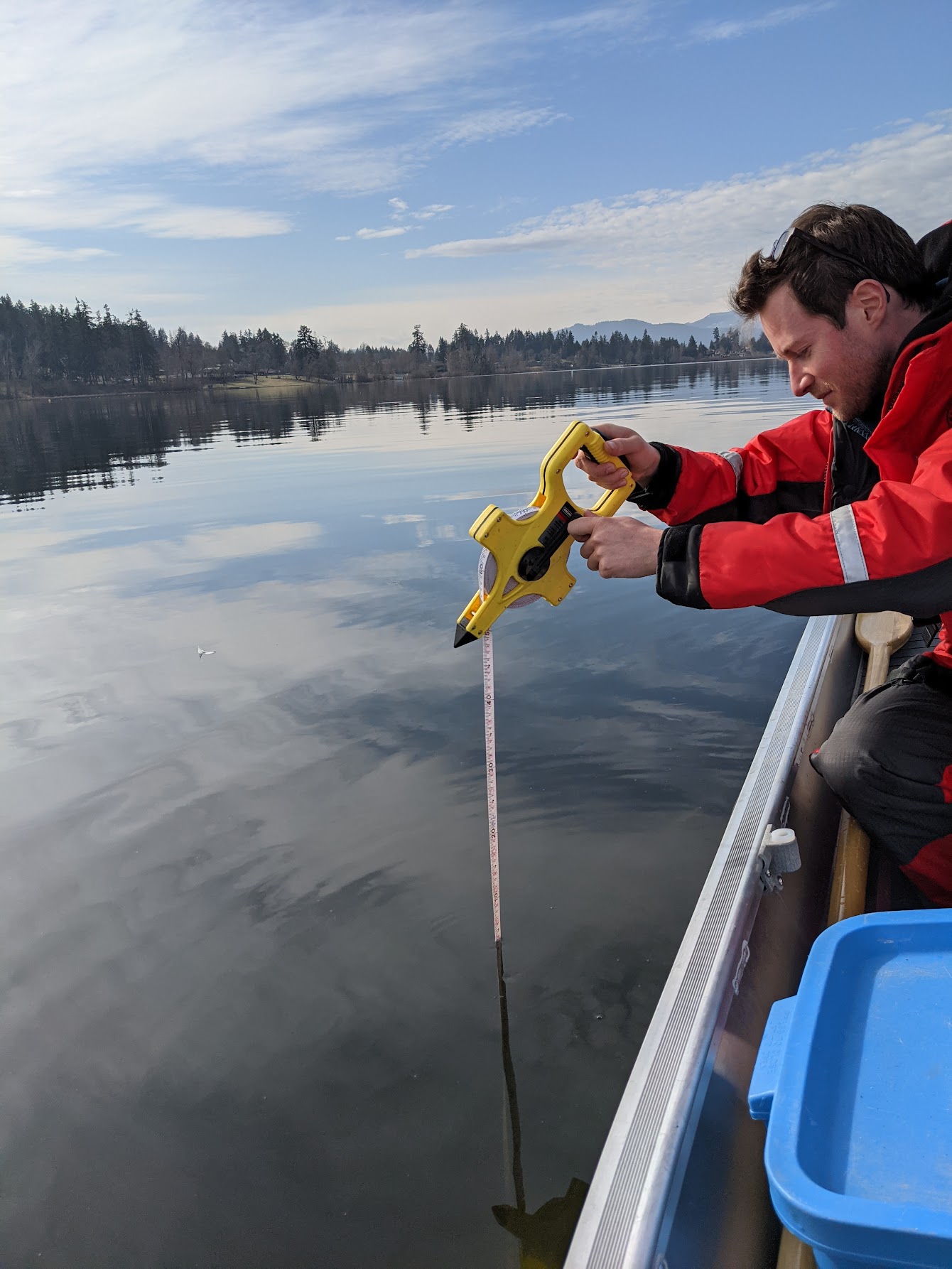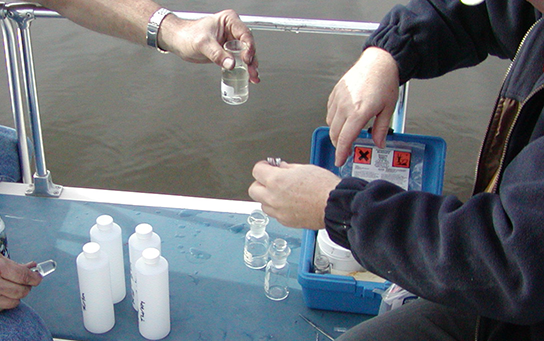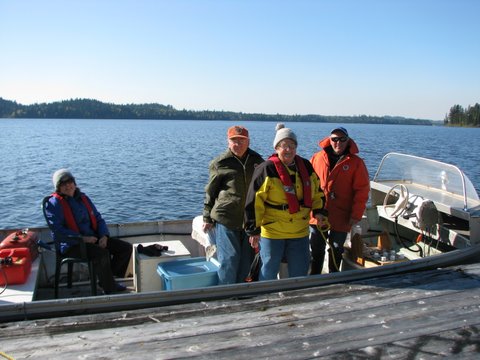Goals, activities, and commitments of the B.C. Lake Stewardship and Monitoring Program
Program goals
- To inspire, promote and support engaged volunteer watershed stewardship across the Province of B.C.
- To build and maintain a volunteer lake monitoring program that shares knowledge to better understand, protect and sustain our aquatic resources
- To develop, promote and support partnerships with volunteers, local stewardship groups and BC Lake Stewardship Society to provide a coordinated approach to volunteer monitoring
- To establish and maintain a baseline of data from lakes to facilitate long term lake management
- To educate volunteers, lake residents and lake users on lake health, best management practices for watershed protection and the control and prevention of invasive species
- To facilitate regular reporting of volunteer collected data to inform lake residents and users, as well as the public

Ministry staff member using a Sechhi disk to measure water clarity.
Overview of core program activities
Lake data and water sample collection by volunteers
Volunteers collect field data and water samples from lakes according to the Level of Study they are participating in. Activities may include:
- measuring for water clarity and surface water temperature trends, and in some cases dissolved oxygen and temperature profiles are collected
- measuring for temperature, dissolved oxygen, and collecting water samples of Phosphorus and Chlorophyll-a
- collecting water samples for nitrogen and other parameters of known concern
Learn more about each Levels of Study in our "Types of Volunteer Monitoring" section.

Water sample analysis by accredited laboratories and lake data interpretation
 The collected water samples are shipped to the Ministry’s contracted and accredited laboratory for analysis. The data analysed from these samples are then sent to Ministry staff who collate, review, and interpret the data.
The collected water samples are shipped to the Ministry’s contracted and accredited laboratory for analysis. The data analysed from these samples are then sent to Ministry staff who collate, review, and interpret the data.
Working with the BC Lakes Stewardship Society, lake reports are produced at the completion of the lake study period, which is typically after three consecutive years.
Copies of the finalized lake reports are distributed to all lake residents. Additionally, community meetings are held for all lake residents where the lake report data can be reviewed and discussed.
For historic lake reports, visit the BC Lake Stewardship Society’s online Library.
Data quality assurance and quality control by program staff

There are several quality assurance and quality control measures in place to ensure data quality. During an audit, program staff will join a volunteer group for a sampling event to ensure that all the data is being collected correctly.
For level 3, 4, and 5 studies, volunteers are required to collect replicate and blank samples for submission to the laboratory along with the regular samples. These types of samples are collected once during each sampling event.
Associated costs and essential equipment
Ministry costs
The cost of a lake monitoring program varies depending on the level of study being conducted. Level 1 to 2 studies have a net zero cost. Higher level studies have higher costs which are mostly related to the laboratory analysis of the collected water samples.
When a lake monitoring program is initiated by the Ministry, the Ministry will cover the equipment and laboratory analysis costs of the program. This includes shipping and laboratory analysis of water chemistry samples, and replacement or repair of any Ministry supplied monitoring or water sampling equipment.

Depending on the level of study, Ministry supplied monitoring and sampling equipment may include:
- a field meter
- secchi disk
- thermometer
- water sampler
- all the forms, instructions and shipping materials
- sample bottles and coolers (for high levels of studies)
Volunteer costs
Monitoring programs may also require watercrafts, fuel and other equipment required for safe watercraft operation, including personal flotation devices. These items must be supplied by volunteers.
Our commitments to volunteers
Volunteers commit to a minimum of 12 monitoring events per year for a 3 year period. The amount of time and effort contributed by volunteers is greatly appreciated as it allows Ministry staff to make use of limited resources while continuing to learn and understand the health of our lakes across the province.
Ongoing support
In return for the commitment that volunteers are making, the Ministry commits to providing consistent and ongoing support to all volunteers and stewardship groups throughout their participation in the program.
Access to lake data
The Ministry will also review the data on an annual basis and make the data accessible to volunteers and the public through the B.C. Lake Monitoring Portal.
Lake summary reports
At the completion of each monitoring program, the Ministry commits to providing a complete 3 year data summary report that includes:
- Interpretation of the lake data
- A determination of the lake's trophic status
- As well as recommendations for future monitoring and lake management
Finally, the Ministry will ensure that lake summary reports are delivered directly to volunteers and stewardship groups. All reports are made available to the general public through the BC Lake Stewardship Society library.
- About the program
- Program goals and core activities
- Types of volunteer lake monitoring activities
- Volunteer requirements
- How to choose a lake
- Volunteer highlights
Contact information
Interested in volunteering?
Contact the Aquatic Stewardship Coordinator for more information and how to start a monitoring program on your lake.
